Van Gogh Museum Journal 2003
(2003)– [tijdschrift] Van Gogh Museum Journal–
[pagina 98]
| |
[Van gogh studies]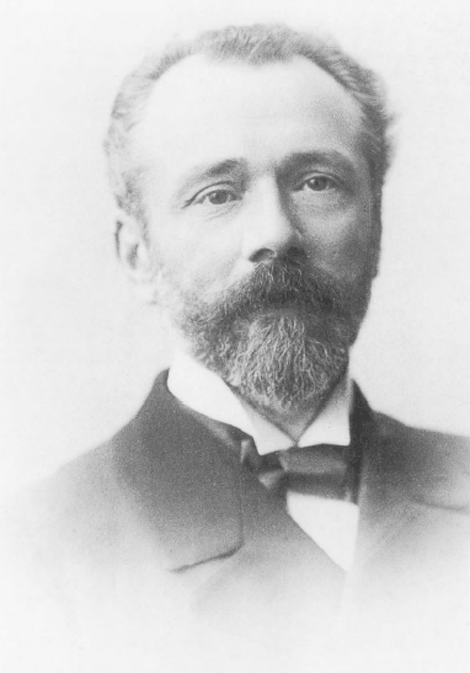 fig. 1
Hermanus Gijsbertus Tersteeg, c. 1885, Amsterdam, Van Gogh Museum Archives | |
[pagina 99]
| |
Self-portrait between the lines: a newly discovered letter from Vincent van Gogh to H.G. Tersteeg
| |
[pagina 100]
| |
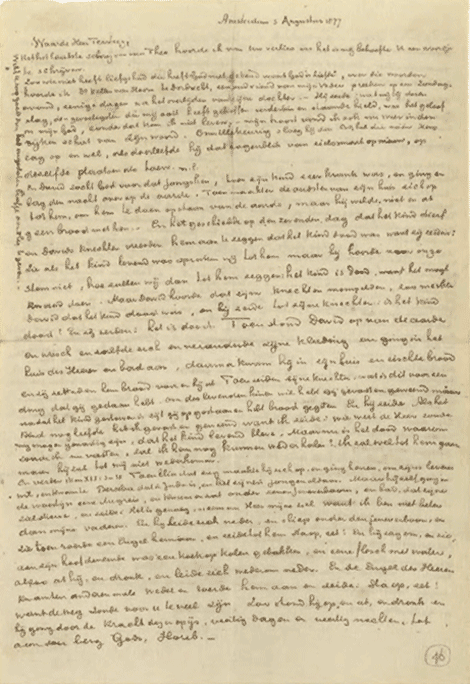 fig. 2
Letter from Vincent van Gogh to Hermanus Gijsbertus Tersteeg, Amsterdam, 3 August 1877, recto, private collection | |
[pagina 101]
| |
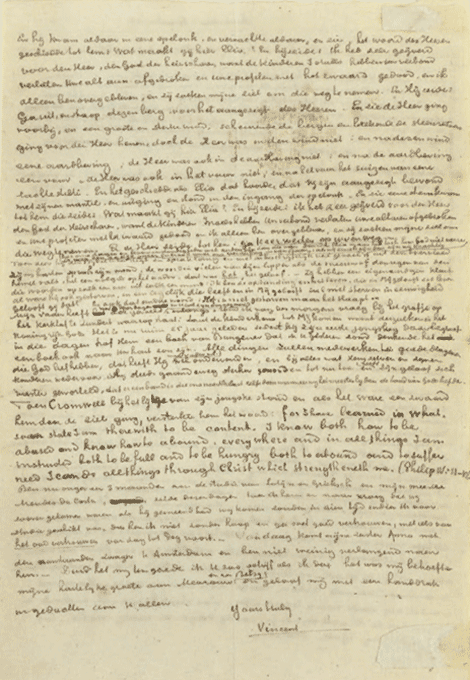 fig. 3
Letter from Vincent van Gogh to Hermanus Gijsbertus Tersteeg, Amsterdam, 3 August 1877, verso, private collection | |
[pagina 102]
| |
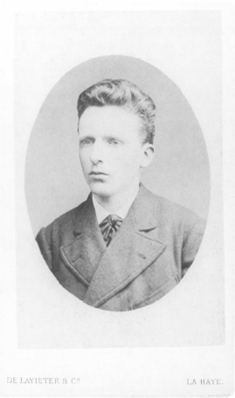 fig. 4
Theo van Gogh, c. 1878, Amsterdam, Van Gogh Museum (Vincent van Gogh Foundation) There can be no doubt as to the letter's authenticity. The paper is identical to that of 13 other letters dating from the Amsterdam period that are preserved in the Van Gogh Museum. A batch of this fair-quality paper had been given to Van Gogh by his Uncle Cor, as Vincent enthusiastically reported to Theo when he used it for the first time.Ga naar voetnoot7 All of these sheets display the same faded black ink. The handwriting is completely in accordance with that seen on other letters written by Van Gogh at this time. The manuscript is still in private hands. The current owner inherited it from his grandmother, who in her youth - from 1896 onward - collected autographs of well-known figures from the world of politics, the arts and literature. Her parents were acquainted with H.G. Tersteeg and his wife. Tersteeg's position in the art trade and his involvement in the artistic life of The Hague naturally meant that he corresponded extensively with famous people. From the notebook in which the young collector recorded her acquisitions, it appears that Tersteeg's wife, ‘Mrs Tersteeg,’ was one of her regular donors. Indeed, she was the one who gave the collector this letter by Van Gogh. That this letter was preserved is all the more surprising because until now we had reason to believe that all the letters Vincent wrote to Tersteeg had been destroyed. On 25 June 1917 Tersteeg's son Johan confessed to H.E. van Gelder that one day they had needed to raise the temperature in the room by several degrees: ‘And we coolly threw two or three hundred letters from Vincent van Gogh into the central heating system when they got in our way. My father thought all that writing unimportant - don't talk, Artist, create!’Ga naar voetnoot8
The letter presented here is therefore the only one known to have survived from what must have been a relatively long and extensive correspondence, carried on, moreover, with a man who for a number of years played a dominant role in the lives of Vincent and Theo van Gogh (fig. 4), and even served as an example to them. Both brothers worked for Tersteeg during their first years in the art trade, in the Hague branch of Goupil on the Plaats (fig. 5), and the boys also visited the family at home. It may be inferred from the tone in which Vincent wrote to Theo in his youthful years about ‘Mr Tersteeg’ that the brothers had great respect for the man who had taken a fatherly interest in them during their adolescence in The Hague, far from the warmth of their parents' home. They learned much from him in the fields of art and literature, and they both kept in touch with him after they had gone to work elsewhere - Vincent to England and Theo to Paris. This fact emerges, for example, in a letter Vincent wrote to Theo from the English village of Isleworth (London) on 26 August 1876: ‘Herewith a note for Mr Tersteeg, the last time I wrote to him I was still in Paris and it's time I wrote again; we've always kept in touch with each other since I | |
[pagina 103]
| |
left The Hague’ [88/74]. Moreover, their mother remarked in a letter to Theo: ‘When Vincent was home last year he let us read letters from Mr Tersteeg which he had received in London. So nice, and kind.’Ga naar voetnoot9 Tersteeg himself could indeed be a warm and entertaining correspondent, as evidenced by a cheering note he sent to Theo, who was home sick with his parents in Etten in November 1876.Ga naar voetnoot10
Dear Theo It is truly a pleasure for me to see from your letter that you are making continual progress. A pity, though, that the weather has not always been kind to you: the stove will often have attracted you more than the country air. That you might feel like starting work again next Monday is thoroughly understandable, and I readily admit that you would not be unwelcome by any means; but as I told you before, it will be much better for both you and me if you come back only when you have regained your strength. I can see from your letter that this is not yet the case. It would be better for you to start by staying another week by the fleshpots of Egypt and then taking another look at your body. If your sleeves and trouser legs are no longer too wide and you feel just as strong as before, there is time enough to inform me that you are on the way. Warm regards and best wishes to you and your parents from us both.
Yours, H.G. Tersteeg. Although Tersteeg did not approve of Vincent's wayward behaviour after he left Goupil in 1876, when Vincent decided while in the Borinage to become an artist, Tersteeg sent him a box of paints and a sketchbook and lent him Charles Bargue's Cours de dessin and Exercises au fusain to help him master the art of drawing.Ga naar voetnoot11 When Van Gogh went to The Hague in 1882 to establish himself as an artist, he expected much from his earlier contact with Tersteeg, but the latter objected to Van Gogh's lifestyle (he was living with the prostitute Sien Hoornik), and 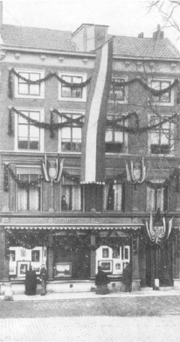 fig. 5
The Boussod, Valadon & Cie. (Goupil & Cie.) gallery in The Hague, 1898, Amsterdam, Van Gogh Museum Archives turned away from him. Being dropped by Tersteeg was one of the most unfortunate aspects of the unhappy social circumstances in which Van Gogh found himself during these difficult years in The Hague. He and Tersteeg would never be on good terms again.
The recently discovered letter, however, dates from the time when their relations were still amiable. Vincent was prompted to write the letter by news he had had from Theo about a blow the Tersteeg family had suffered, a fact | |
[pagina 104]
| |
 fig. 6
Letter 124/104 from Vincent to Theo van Gogh, Amsterdam, 3 August 1877 (detail), Amsterdam, Van Gogh Museum (Vincent van Gogh Foundation)  fig. 7
Postscript written crosswise on the recto of the letter from Vincent van Gogh to Hermanus Gijsbertus Tersteeg (fig. 2) we knew already from a letter Vincent had written to Theo on Friday, 3 August 1877: ‘What you write about Mr Tersteeg's loss, that his youngest child has died, moved me and I felt the need to write to him again’ [124/104] (fig. 6).Ga naar voetnoot12 We now know that Vincent was not only intending to write a letter of condolence, but that he had in fact already done so. The postscript written in the left-hand margin of the first page (fig. 7) reveals that the two letters - to both Theo and Tersteeg - were actually sent in the same envelope from Amsterdam to The Hague. That Van Gogh asked the mourning father to pass on the enclosed letter to Theo is beyond the pale by present-day standards, and was probably considered improper at the time as well. Seen in a practical light, it is understandable that Vincent should ask this - Theo and Tersteeg worked in the same building, Vincent was always short of money and sending a letter this way saved him the cost of a stamp - though his request comes across as rather indelicate.Ga naar voetnoot13 It is not only this self-serving faux pas that is characteristic of Vincent: the rest of the letter's contents are equally revealing. During the period in question, the 24-year-old Van Gogh was living with his uncle Jan van Gogh at the naval dockyard in Amsterdam, where he was preparing to take the entrance examination to study theology. He wanted to become a clergyman, just like his father and his uncle Johannes Stricker, whom at this time he still held in great esteem. The Amsterdam letters are thus peppered with pious talk - whether derived from the Bible, Protestant hymns or rhyming psalms - since he was ultimately to become, as he himself said, a ‘sower of the word.’ In these years, religious faith admittedly played a dominant role in the social and personal life of the Dutch - in the letter quoted above, Tersteeg also made use of a light-hearted reference to Exodus 16:3. But Van Gogh's religious zeal was excessive, not only in the eyes of his sister Lies, who complained that her brother had gone ‘daffy with piety,’ but even in the eyes of their father, who confessed his concern to Theo: ‘Oh, if only he would learn to be simple like a child, and not to bandy biblical texts about in such an exaggerated and overwrought manner - it is the cause of increasing worry to us and I fear that one day he will become unfit for practical life. It is such a great pity. What are his letters to you like? If he wants to be an evangelist, he must be willing to undertake the preparation and necessary study. Then I would have more faith in it. Now, though, we have to go to bed. We are tired and not very cheerful, if only things would brighten up.’Ga naar voetnoot14 | |
[pagina 105]
| |
 fig. 8
Passage regarding the still-born Vincent on the verso of the letter from Vincent van Gogh to Hermanus Gijsbertus Tersteeg (fig. 3) At first glance the new letter is an unenlightening addition to the 30 other Amsterdam missives, which testify to an obsession with edifying and scriptural texts. But things are not what they seem here. First of all, the writer took pains to include in his condolence letter a few of the traditional ingredients, such as helping the bereaved parents to acknowledge their loss, expressing his sympathy and offering appropriate quotations.Ga naar voetnoot15 This suggests that Van Gogh did not simply write down whatever popped into his head; on the contrary, he seems to have kept his mind fixed on a preconceived rhetorical aim. On the one hand, the elaborateness of his epistle exceeded the generally accepted prescription for letters of condolence: if the friendship was not a particularly close one, it was thought best to keep the letter short. On the other, his letter did contain the formulaic elements recommended in those days: an allusion to the parents' mourning, to God's moving in mysterious ways, and a comparison to other unhappy parents who have suffered a similar ordeal.Ga naar voetnoot16 To improve its overall appearance, he went over the finished letter and made his rather pernickety handwriting more readable by tracing over many of the letters. And, what is more - and, moreover, of psychological interest - he here made a conscious attempt to compose a piece of pastoral writing, ambitiously casting himself in the role of consoling counsellor and thereby giving himself a taste of the ministry to which he aspired. The central theme, the loss of a child, is introduced by way of Vincent's recollection of the much-admired Dordrecht minister P.M. Keller van Hoorn, who had also lost a child and could therefore serve as an example to Tersteeg. Keller van Hoorn found in religious faith the strength to bear that loss - even to see a deeper meaning in it, as befits an adherent of Protestant-Christian teachings. The biblical passages quoted by Keller van Hoorn in a sermon delivered at the time are copied out for Tersteeg in their entirety, and not only Keller van Hoorn but also such greats as King David, the prophet Elijah and Oliver Cromwell are held up to Tersteeg as examples. By way of added consolation, Van Gogh had sent the day before a comforting little book, most likely L.L.F. Bungener's Bij het lijkje van mijn kind: drie dagen uit het leven van een vader (‘Keeping vigil over the body of my child: three days in the life of a father’), which he says had given his own father much comfort in a similar situation. This last bit of information is one of the most startling passages in the letter, since it is here that we find for the first time a reference by Van Gogh to his stillborn brother Vincent, born exactly one year before him (fig. 8). | |
[pagina 106]
| |
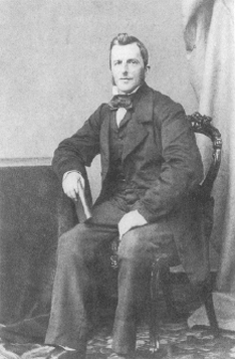 fig. 9
Theodorus van Gogh, c 1852, Amsterdam, Van Gogh Museum There has been much speculation about the effect this event must have had on Vincent - the inevitable trauma of being a ‘replacement child’ and the influence this supposedly had on the development of his personalityGa naar voetnoot17 - but until now no trace of this episode was to be found in the extant documents.Ga naar voetnoot18 Now we see Vincent pausing to reflect on what had taken place in 1852. Theodorus van Gogh was 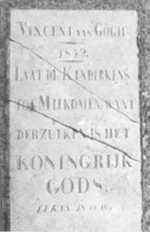 fig. 10
Gravestone at Zundert of the Vincent born dead in 1852, Amsterdam, Van Gogh Museum Archives 30 years old at the time (fig. 9); Vincent's mother, Anna Van Gogh-Carbentus, 33. They were therefore at the same stage in life as Tersteeg in 1877. The gravestone in the Zundert cemetery bears the biblical passage quoted in the letter: ‘Suffer the little children to come unto me, for of such is the kingdom of God’ (fig. 10). There is nothing to indicate that Van Gogh dwelled excessively on this event; on the contrary, he attaches to it no personal emotion or recollection. This had nothing to do with the high rate of mortality in this period, which supposedly made death more ‘normal.’ That the rate of child mortality was much higher then than it is now does not mean that there was less suffering at the loss. This is evident from the many and various outpourings of sorrow and emotion dating from the time.Ga naar voetnoot19 Moreover, it was of course the parents who were weighed down with suffering and not the baby born a year later. Until now, the only reference to this | |
[pagina 107]
| |
event in the letters was a very indirect one: Vincent mentions the Zundert cemetery after he had gone there one night in April 1877 on his way to visit a dying acquaintance.Ga naar voetnoot20 Even though in such circumstances he must have been thinking about death, he does not mention the child's grave. All in all, there is no hard evidence to prove that Van Gogh was plagued by the feelings of guilt often experienced - according to some child psychologists - by ‘replacement children.’ These should not be confused, however, with the feelings of inadequacy that Van Gogh may have had later on, when he failed to live up to the expectations his parents naturally had for their eldest son. The close of the letter affords some insight into the personality of a man who was egocentric by nature: in his typical brusque manner. Van Gogh changes the subject and jumps from condolence to his own situation. This abrupt change of tack was certainly not prescribed by the conventional formulas for such letters. Clearly, Van Gogh wanted to take advantage of this opportunity to show Tersteeg that things were going well for him in his new life, calling upon a witness - his tutor, Mendes da Costa - to supply corroborative testimony. Mentioning the arrival of his sister Anna and her fiancé was also a way of showing that he was perfectly capable of making his way in the world. Whether Tersteeg was in the mood for such talk is questionable. The sentence at the end - ‘Do not think ill of me for writing to you as I have done, I felt the need to do it’ - cannot be considered a closing dictated by the conventions of the genre. And the laconic request in the margin even less so.
Van Gogh cannot be approached more closely than through his letters. Though they are not always unqualified self-portraits, they usually betray a contour or a bit of background, point out a few highlights or draw attention to some shadows, or add a finishing touch. This unexpected relic of the correspondence with Tersteeg, an important person in Van Gogh's life, has added biographical and psychological depth to an already exceptional corpus of letters. | |
Text (for notes see pp. 109-11)
| |
[pagina 108]
| |
en eischte brood en zij zetteden hem brood voor en hij at_ Toen zeiden zijne knechten: wat is dit voor een ding dat gij gedaan hebt. om des levenden kinds wil hebt gij gevast en geweend maar nadat het kind gestorven is zijt gij opgestaan en hebt brood gegeten_ En hij zeide, Als het kind nog leefde heb ik gevast en geweend want ik zeide: wie weet de Heer zoude mij mogen genadig zijn, dat het kind levend bleve. Maar nu is het dood, waarom zoude ik nu vasten, zal ik hem nog kunnen wederhalen? ik zal wel tot hem gaan maar hij zal tot mij niet wederkomen.Ga naar voetnoot6 En verder 1 Kon XIX:3-15 Toen Elia dat zag maakte hij zich op, en ging henen, om zijns levens wil, en kwam te Berseba dat in Juda is, en liet zijnen jongen aldaar. Maar hijzelf ging in de woestijn eene dagreis, en kwam en zat onder eenen jeneverboom, en bad, dat zijne ziel stierve, en zeide: Het is genoeg, neem nu Heer mijne ziel_ Want ik ben niet beter dan mijne vaderen. En hij leide zich neder, en sliep onder den jeneverboom, en zie toen roerde een Engel hem aan, en zeide tot hem, sta op, eet! En hij zag om, en zie, aan zijn hoofdeneinde was een koek op kolen gebakken, en eene flesch met water, alzoo at hij, en dronk, en leide zich wederom neder. En de Engel des Heeren kwam ten anderen male weder en roerde hem aan en zeide: Sta op, eet! want de weg zoude voor u te veel zijn_ Zoo stond hij op, en at, en dronk en hij ging door de kracht dezer spijs, veertig dagen en veertig nachten, tot aan den berg Gods, Horeb. - En hij kwam aldaar in eene spelonk, en vernachtte aldaar, en zie, het woord des Heeren geschiedde tot hem: Wat maakt gij hier Elia? En hij zeide: ik heb zeer geijverd voor den Heer, den God der heirscharen, want de kinderen Israëls hebben uw verbond verlaten, Uwe altaren afgebroken en Uwe profeten met het zwaard gedood, en ik alleen ben overgebleven, en zij zoeken mijne ziel om die weg te nemen. En Hij zeide: Ga uit, en sta op dezen berg voor het aangezigt des Heeren. En zie de Heer ging voorbij, en een groote en sterke wind, scheurende de bergen en brekende de steenrotsen ging voor den Heer henen, doch de Heer was in den wind niet: en na dezen wind eene aardbeving: de Heer was ook in de aardbeving niet: en na de aardbeving een vuur, de Heer was ook in het vuur niet; en na het vuur het suizen van eene zachte stilte. En het geschiedde als Elia dat hoorde, dat Hij zijn aangezigt bewond met zijnen mantel, en uitging en stond in den ingang der spelonk. En zie eene stem kwam tot hem die zeide: Wat maakt gij hier Elia? En hij zeide: ik heb zeer geijverd voor den Heer, den God der Heirscharen, want de kinderen Israels hebben Uw verbond verlaten. Uwe altaren afgebroken en Uwe profeten met het zwaard gedood en ik alleen ben overgebleven, en zij zoeken mijne ziel om die weg te nemen. En de Heer zeide tot hem: Ga, keer weder op uwen weg. -Ga naar voetnoot7 Toen deed hij den Bijbel weer digt en sprak lang en met onbeschrijfelijk veel gevoel hoe onze dagen en levensomstandigheden wel anders zijn dan die van David en Elia maar hoe toch hun God niet verre is van een iegelijk onzer en er ook voor ons versterking is van Boven, als wij zwak zijn dan zijn wij krachtig,Ga naar voetnoot8 uit den overvloed zijns harten sprak zijn mond,Ga naar voetnoot9 de woorden vielen van Zijne lippen als de sneeuw of den regen van den hemel valt,Ga naar voetnoot10 het een volgde op het ander, dat was het, het geloof. - Zij hebben een eigenaardigen klank die woorden op zulk een uur uit zulk een mond: Ik ben de opstanding en het leven, die in Mij gelooft zal leven al ware hij ook gestorven, en een iegelijk die leeft en in Mij gelooft zal niet sterven in eeuwigheid_ Gelooft gij dat?Ga naar voetnoot11 En ook dat andere woord: Het is niet gestorven maar het slaapt. -Ga naar voetnoot12 Mijn Vader heeft ook gevoeld wat dezer dagen in U zal zijn omgegaan, onlangs stond ik nog des morgens vroeg bij het grafje op het kerkhof te Zundert waarop staat: Laat de kinderkens tot Mij komen want derzulken is het koningrijk Gods_Ga naar voetnoot13 Het is nu ruim 25 jaar geleden sedert Hij Zijn eerste jongsken daar begroef, in die dagen trof Hem een boek van BungenerGa naar voetnoot14 dat ik U gisteren zond, denkende het een boek ook naar Uw hart zou zijn. Alle dingen zullen medewerken ten goede dengenen die God liefhebben,Ga naar voetnoot15 dat heeft Hij (mijn Vader n.l.)Ga naar voetnoot16 wel ondervonden, en bij alles wat Hem zalven en zijnen kinderen wedervoer is Hij steeds gaandeweg sterker geworden tot nu toe, en heeft zijn geloof zich vaster geworteld, dat er een band is die ons nooit loslaat zelfs dan wanneer wij het meeste lijden, de band van Gods liefde. Toen CromwellGa naar voetnoot17 bij het lijkje van zijn jongske stond en als het ware een zwaard hem door de ziel ging,Ga naar voetnoot18 versterkte hem het woord: for I have learned, in whatsoever state I am, therewith to be content. I know both how to be abased and know how to abound, every where and in all things I am instructed both to be full and to be hungry, both to abound and to suffer need_ I can do all things through Christ which strengtheneth me. (Philip IV:11-13)_Ga naar voetnoot19 | |
[pagina 109]
| |
Ben nu ongeveer 3 maanden aan de studie van Latijn en Grieksch en mijn meester Mendes da Costa,Ga naar voetnoot20 zeide dezer dagen toen ik hem er naar vroeg dat wij zoover gekomen waren als hij gemeend had wij komen zouden in dien tijd indien ik voor studie geschikt was, dus ben ik niet zonder hoop en ga met goed vertrouwen, met iets van het oud vertrouwenGa naar voetnoot21 van dag tot dag voort. - Vandaag komt mijne zuster Anna met den aanstaanden zwager te Amsterdam en ben niet weinig verlangend naar hen. -Ga naar voetnoot22 Duid het mij ten goede ik U zoo schrijf als ik doe, het was mij behoefte_ mijne hartelijke groete aan Mevrouw en aan BetsyGa naar voetnoot23 en geloof mij met een handdruk in gedachten aan U allen
Yours truly Vincent
Wilt U zoo goed zijn het ingesloten briefje aan Theo te geven. - | |
English translationAmsterdam, 3 August 1877
Dear Mr Tersteeg, Theo told me of your loss in his last letter,Ga naar voetnoot1 and I feel the need to write a few words to you. ‘He that loveth not knoweth not God; for God is Love,’Ga naar voetnoot2 I heard Rev. Keller van Hoorn, an old friend of my Father, deliver a sermon on this text in Dordrecht one Sunday evening, a few days after the death of his daughter.Ga naar voetnoot3 He said: what has given me strength and kept me going after this, the most crushing blow I have ever been dealt, was faith in my God, without which I cannot live - I found comfort yet again in the great riches of His words. He couldn't help opening the Bible that lay before him and, as though reliving that moment of heartbreak, hit upon the same passage as then, namely: David therefore besought God for the child, when his child was very sick,Ga naar voetnoot4 and went in,Ga naar voetnoot5 and lay all night upon the earth. And the elders of his house arose, and went to him, to raise him up from the earth: but he would not, neither did he eat bread with them. And it came to pass on the seventh day, that the child died. And the servants of David feared to tell him that the child was dead: for they said, Behold, while the child was yet alive, we spake unto him, and he would not hearken unto our voice: how will he then vex himself, if we tell him that the child is dead? But when David saw that his servants whispered, David perceived that the child was dead: therefore David said unto his servants, Is the child dead? And they said, He is dead. Then David arose from the earth, and washed, and anointed himself, and changed his apparel, and came into the house of the Lord, and worshipped: then he came to his own house; and when he required, they set bread before him, and he did eat. Then said his servants unto him, What thing is this that thou hast done? thou didst fast and weep for the child, while it was alive; but when the child was dead, thou didst rise and eat bread. And he said, While the child was yet alive, I fasted and wept: for I said, Who can tell whether God will be gracious to me, that the child may live? But now he is dead, wherefore should I fast? can I bring him back again? I shall go to him, but he shall not return to me.Ga naar voetnoot6 And also 1 Kings XIX:3-15: And when Elijah saw that, he arose, and went for his life, and came to Beer-sheba, which belongeth to Judah, and left his servant there. But he himself went a day's journey into the wilderness, and came and sat down under a juniper tree: and he requested for himself that he might die; and said, It is enough; now, O Lord, take away my life; for I am not better than my fathers. And as he lay and slept under a juniper tree, behold, then an angel touched him, and said unto | |
[pagina 110]
| |
him, Arise and eat. And he looked, and, behold, there was a cake baken on the coals, and a cruse of water at his head. And he did eat and drink, and laid him down again. And the angel of the Lord came again the second time, and touched him, and said, Arise and eat; because the journey is too great for thee. And he arose, and did eat and drink, and went in the strength of that meat forty days and forty nights unto Horeb the mount of God. And he came thither unto a cave, and lodged there; and, behold, the word of the Lord came to him, and he said unto him. What doest thou here, Elijah? And he said, I have been very jealous for the Lord God of hosts: for the children of Israel have forsaken thy covenant, thrown down thine altars, and slain thy prophets with the sword; and I, even I only, am left; and they seek my life, to take it away. And he said, Go forth, and stand upon the mount before the Lord. And, behold, the Lord passed by, and a great and strong wind rent the mountains, and brake in pieces the rocks before the Lord; but the Lord was not in the wind: and after the wind an earthquake; but the Lord was not in the earthquake: and after the earthquake a fire; but the Lord was not in the fire: and after the fire a still small voice. And it was so, when Elijah heard it, that he wrapped his face in his mantle, and went out, and stood in the entering in of the cave. And, behold, there came a voice unto him, and said, What doest thou here, Elijah? And he said, I have been very jealous for the Lord God of hosts: because the children of Israel have forsaken thy covenant, thrown down thy altars, and slain thy prophets with the sword; and I, even I only, am left; and they seek my life, to take it away. And the Lord said unto him, Go, return on thy way.Ga naar voetnoot7 Then he closed the Bible and spoke at length and with incredible feeling about how our days and circumstances are different from those of David and Elijah, yet their God is not far from each and every one of us, and for us, too, there comes strength from Above, for when we are weak, then are we strong,Ga naar voetnoot8 his mouth spoke from the abundance of the heart,Ga naar voetnoot9 the words fell from his lips as the snow or the rain cometh down from heaven,Ga naar voetnoot10 one thing followed another, this was it, faith. Those words have a special sound coming at such moments from such lips: I am the resurrection, and the life: he that believeth in Me, though he were dead, yet shall he live: and whosoever | |
[pagina 111]
| |
liveth and believeth in Me shall never die. Believest thou this?Ga naar voetnoot11 And those other words too: She is not dead, but sleepeth.Ga naar voetnoot12 My Father has also felt what you will have been feeling these past days. I recently stood early one morning in the cemetery at Zundert next to the little grave on which is written: Suffer the little children to come unto Me, for of such is the kingdom of God.Ga naar voetnoot13 More than 25 years have passed since he buried his first little boy there, in those days he was moved by a book by BungenerGa naar voetnoot14 which I sent to you yesterday, thinking it would be a book after your own heart. All things will work together for good to them that love God,Ga naar voetnoot15 this has been his (namely my Father's)Ga naar voetnoot16 experience at least, and in everything that has befallen him and his children he has until now grown gradually stronger, and his faith has taken root more firmly, so that there is a bond that never lets go of us, not even when we suffer the most, the bond of God's love. When CromwellGa naar voetnoot17 was standing by his little boy's body and a sword pierced his soul,Ga naar voetnoot18 as it were, these words gave him strength: for I have learned, in whatsoever state I am, therewith to be content. I know both how to be abased and know how to abound, every where and in all things I am instructed both to be full and to be hungry, both to abound and to suffer need. I can do all things through Christ which strengtheneth me (Philip IV:11-13).Ga naar voetnoot19 Have now been studying Latin and Greek for about 3 months and my tutor, Mendes da Costa,Ga naar voetnoot20 said a few days ago when I asked him about it that we had progressed as far as he thought we would in this amount of time if I were suited for study, so I am not without hope and I go on from day to day with good hope, with something of the faith of old.Ga naar voetnoot21 My sister Anna is coming to Amsterdam today with my future brother-in-law and I am looking forward not a little to seeing them.Ga naar voetnoot22 Do not think ill of me for writing to you as I have done, I felt the need to do it. My warm regards to Mrs Tersteeg and BetsyGa naar voetnoot23 and believe me, with a handshake in thought to all of you
Yours truly Vincent
Would you be so good as to give the enclosed note to Theo? |
|

